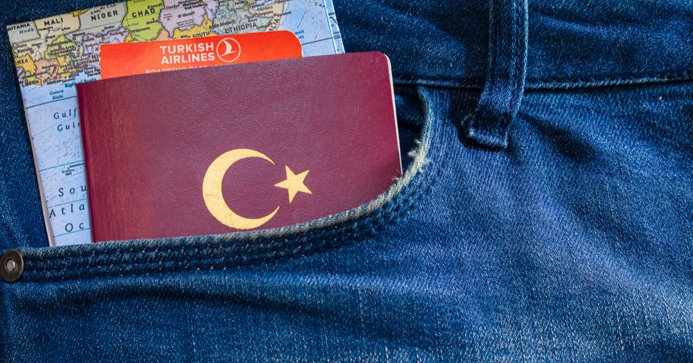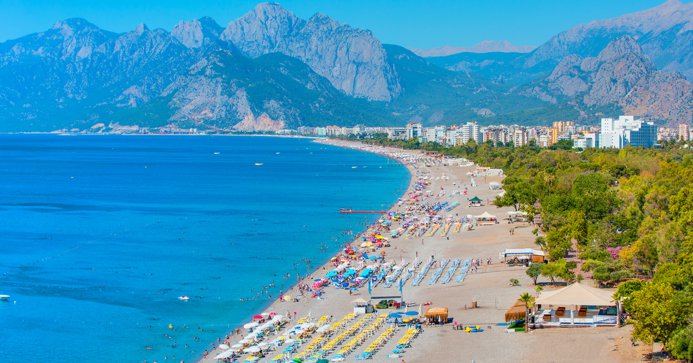Turkish citizenship: how to get a passport in 2024

Just 5 years ago the vast majority (about 70%) of foreigners’ applications for Turkish citizenship were based on marriage or naturalisation. Now the situation has changed and almost half of the applicants are investors and entrepreneurs. In this article, we will review all the ways to obtain Turkish citizenship and the reasons to obtain it, as well as go through the list of the required documents. In general, it is not difficult to become a Turkish citizen, you do not have to renounce the citizenship of your native country, and the costs will pay off with the benefits that the status of a Turkish citizen gives.
Conditions for obtaining Turkish citizenship
The acquisition of Turkish citizenship is governed by Law No. 5901 of the Turkish Civil Code. Briefly, there are three main ways of obtaining Turkish citizenship:
- Live in Turkey for more than 5 years with a residence permit, have a job and housing (citizenship by naturalisation).
- Invest in Turkish assets, such as buying a property worth more than 400,000 US dollars.
- Marry a Turkish citizen.
There are also rare and exceptional cases of obtaining citizenship, which we will delve into along with the main ones in this article.
Citizenship by naturalisation
In order to obtain Turkish citizenship by naturalisation, several conditions must be met:
Live in Turkey for 5 years | During this period, it is allowed to be absent from the country for up to 6 months. In the case of treatment abroad, this period may be extended. When calculating the continuous period of stay, the period based on a student permit is counted with a coefficient of 0.5, periods of residence on other grounds are counted in full. The period of stay on the basis of a tourist visa does not count. |
|---|---|
Confirm your intention to live in Turkey | Any option will suffice: — buy a property in Turkey and get a residence permit; — create or relocate a business; — make an investment; — get a job with a work permit; — marry a Turkish citizen; — apply for the acquisition of citizenship by the whole family; — get an education in Turkey; — have a close relative (parents, siblings, children), who is a Turkish citizen. |
Be fluent in Turkish | No special language exam is required. Language proficiency is assessed at an interview with a citizenship inspector. |
Be able to provide a living in Turkey for yourself and for dependents | It is not necessary to confirm income, if it is not available at the time of application, the commission will consider the presence of a demanded specialty. |
Be an adult under the laws of your country | For stateless persons, the age of majority is determined by the laws of Turkey. |
Do not pose a threat to national security or public order | This is checked through requests to the Turkish Ministry of Internal Affairs. |
Possess high moral values | To be a good person. There are no special checks, only a few simple questions at an interview in a conversational format. |
Citizenship by investment
Foreign investors have the right to obtain Turkish citizenship within the period of 6–12 months under a simplified programme.
To participate in the citizenship by investment programme, one of the following conditions must be met:
- Buy a property in Turkey worth at least 400,000 US dollars. Acquired real estate is allowed to be sold after 3 years, while citizenship will be preserved. This is the most popular way of investment citizenship in Turkey: firstly, it is the least expensive one, and secondly, with the right choice of real estate, you can get a yield of 3–8% per annum and profitably resell in a few years, as property prices in Turkey are on the rise. Read more about Turkish citizenship by real estate investment.
- Invest 500,000 US dollars or more in Turkish companies’ shares.
- Create at least 50 jobs in Turkey.
- Make a deposit of at least 500,000 US dollars (or other currency equivalent) at a Turkish bank on the condition that you will not withdraw funds for 3 years.
- Buy Turkish government bonds worth at least 500,000 US dollars on the condition that they will not be sold for 3 years.
- Buy a share of a Turkish investment or venture fund worth at least 500,000 US dollars and not sell it for 3 years.
Citizenship by marriage
On the basis of marriage to a Turkish citizen, a foreigner can apply for Turkish citizenship after 3 years of being officially married and living in the marital union.
There is no strict requirement to live in Turkey. If a foreigner lives abroad, then he or she applies for Turkish citizenship to the consulate in the territory of the country of residence. However, in this case, the Turkish citizen spouse must live with the applicant in this country. It doesn’t matter in which country the marriage took place.
Citizenship by descent
At the moment, for citizenship by repatriation, the Turkish citizenship law has only a temporary article in relation to foreigners originating from Turkic nationalities. Interestingly, it does not provide for any special conditions, simplifying the process of acquiring citizenship. Foreigners with Turkic roots must live in Turkey under general conditions in order to be eligible for citizenship.
However, belonging to the Turkic peoples, which can be proven, is considered as a positive factor for making a decision.
Additionally, Turkey launches citizenship programmes under exceptional conditions from time to time for representatives of certain nationalities, for example, the Uighurs of East Turkestan or the Meskhetian Turks.
Turkish citizenship by birth
Citizenship by birth is acquired immediately after birth and is divided into two types: by blood and by birthplace.
Citizenship by blood
Children whose at least one parent is a Turkish citizen are granted Turkish citizenship. It does not matter whether the parents are married or not, the place of birth also does not matter.
Citizenship by birthplace
Children who were born in Turkey and did not receive any other citizenship from their mother or father are also eligible for Turkish citizenship.
Citizenship through adoption
A minor child with foreign citizenship who is adopted by a Turkish citizen can acquire Turkish citizenship immediately after the decision on adoption.
Turquoise card
The Turquoise Card (Turkuaz Kart) provides the right to permanent residence, work, business, and social security in Turkey. The only limitation compared to citizenship is the lack of the right to vote in elections and enlist in the military. The Turquoise Card is governed by the Legislative Decree of 14 March 2017.
Foreigners who can apply for the Turquoise Card:
- Highly qualified specialists. This category is assessed by the level of education, salary, professional skills and experience, contribution to science and technology.
- Investors. This category is assessed by the amount of investment or export to Turkey or the investment contribution to scientific and technological development.
- Scientists and researchers in fields of science of value in Turkey and in the international community.
- Internationally successful cultural and sports figures.
- Promoters of Turkish national interests or culture in the international community.
The first Turquoise card is issued for 3 years. For this period an inspector is appointed to monitor the activities of the Turquoise card holder in Turkey. If during this time the inspector does not have grounds for cancellation (gross violations of public order or the law), the Turquoise card is extended indefinitely.
Spouses and children of the Turquoise card holder receive a Turkish residence permit for the corresponding period.
Exceptional cases
There are several categories of foreigners who can obtain Turkish citizenship on exceptional grounds at the suggestion of ministries and with the Cabinet of Ministers’ approval:
- individuals who develop Turkish industrial facilities (build, import or invest);
- individuals who make a significant contribution to the scientific, cultural, economic, technological, and social projects of Turkey. In this case, the invitation to obtain citizenship comes from the relevant ministries;
- refugees;
- individuals who need to be granted citizenship. This clause reserves the right for the government to grant citizenship to foreigners in rare and exceptional cases that are not mentioned in the law.
Why is it a good idea to live in Turkey?
The popularity of Turkey for emigration is growing. In 2017, the overall number of residence permits issued was about 600,000. By March 2024, more than a million foreigners were living in Turkey with a residence permit.
Expats lay special emphasis on the following advantages of living in Turkey:
- Sea, mountains, climate. On the coast of three seas (the Mediterranean, the Aegean and the Marmara) a Mediterranean climate reigns, while the Black Sea resorts of Turkey are indulged by a temperate maritime climate. Thus, in summer there is no excessive heat, and in winter there is no snow. Most cities far from the sea are located in the continental climate zone, so there are warm summers and real winters. There are many ski resorts in mountainous areas.
- Care. In Turkey, everything is organised with people in mind: from the manager of the house to the work of city services and feedback from the authorities. Free public beaches with showers, toilets and sports grounds are organised in coastal areas. Visitors note the high quality of services and convenient long-distance transport links.
- Comfortable living. Most of the new residential complexes are built with internal infrastructure: swimming pools, playgrounds and gardens, recreation areas, gyms and parking.
- Fruits and vegetables are available in a wide variety all year round at low prices. In season, fruits can be picked directly from fruit trees on the streets.
- People. It is customary in Turkey to be friendly and smile. The locals are polite and courteous towards visitors. And although Islam is practiced everywhere in Turkey, people of different faith are treated with acceptance.
- History and culture. Turkey is one of the oldest areas inhabited by people. Over the centuries of history, Ottoman, European, Middle Eastern and Asian traditions have intertwined here, leaving countless monuments.
- Medicine. Turkey is an international centre of medical tourism due to the abundance of public and private clinics with modern equipment and qualified specialised doctors. Some services, such as dental services, are much cheaper here than in other countries. In addition, the Turkish government regulates the prices of medicines, determining the limits above which pharmacies are not allowed to sell.
- Education. Quality public and private education for school children, including for foreigners in different languages. Graduates of local schools are fully prepared for admission to European universities. Higher education complies with European standards and levels, so students can transfer to European universities without additional exams. The cost of school and higher education is lower compared to European universities, while at the same time the state provides grants for Turkish and foreign students.
Residence permit. It is possible for foreigners to obtain a residence permit in Turkey: it is enough to buy or rent a house. With a residence permit (ikamet) you can live in Turkey on an almost equal footing with citizens. Previously, however, it was possible to obtain a residence permit in Turkey with the purchase of a property for 75 thousand U.S. dollars in metropolitan provinces, and 50 thousand U.S. dollars in other provinces. In October 2023, the minimum amount reached 200 thousand dollars in all areas of the country. Only one property is taken into account.

The benefits of Turkish citizenship
- the application procedure is relatively simple and quick: applications are considered up to 180 days, but usually about three months;
- you can retain citizenship in your country of origin: Turkey allows dual citizenship;
- multiple family members can be included in one citizenship application;
- visa-free entry to 110+ countries of the world, including Singapore, Japan, and Hong Kong;
- the opportunity to apply for a US E-2 non-immigrant visa for 5 years with the possibility of extension (available to certain countries only), as well as a tourist visa for 10 years;
- business opportunities: reduced tax rates, subsidies for entrepreneurs, special trade and industrial zones, business support programs. Additionally, Turkey’s Customs Union agreement with the European Union provides benefits for exporters and importers, and Turkey’s convenient geographic location simplifies logistics for international business.
Documents for obtaining Turkish citizenship
The following documents are required along with the VAT FORM 6 citizenship application:
- International passport valid for at least 6 months.
- 6 photographs 3×4 cm in size.
- Birth certificate.
- Certificate of marital status (certificate of marriage, non-marriage or divorce).
- Power of attorney, if documents are submitted by an authorised person.
- Certificate of no criminal record.
If family members are included in the application, then the spouses prepare a similar package of documents, as for children, the consent of the second parent and a certificate of marriage or divorce of the parents will be required.
All documents must be apostilled in the home country, then translated and certified by a Turkish notary.
To obtain citizenship by naturalisation, a Turkish residence permit (ikamet) will need to be added to the list of citizenship documents.
Citizenship by investment will require supporting documents, a residence permit and an investment certificate from the relevant ministry. So in the case of citizenship by investment in real estate, a certificate of conformity from the Ministry of Environment and Urbanisation must be attached to the application.
To obtain this certificate, you will need a certificate of ownership (TAPU) and a certificate of conformity of the investment from the Banking Regulation and Supervision Agency.
When submitting an application, you must bring the original documents with you. After the immigration inspector checks the documents, you need to pay the state fee of 100 Turkish liras in the tax office and hand over the receipt to the inspector. When all documents are accepted, the applicant is given a special number by which you can track the readiness of documents in the Department of Population and Citizenship Affairs. After 3–6 months, when the verification of documents is completed, the applicant is invited for an interview.
Application forms and lists of required documents for all citizenship cases can be downloaded from the website of the Department of Population and Citizenship Affairs.
When can citizenship be denied?
The most common cases when Turkey refuses citizenship candidates:
- If the applicant has lived in Turkey on a tourist visa and is applying for citizenship on this basis. The main reason for obtaining Turkish citizenship is the intention to reside in the country. A tourist visa does not confirm such an intention.
- Citizenship by marriage is denied if the marriage is dissolved or one of the spouses filed for divorce during the consideration of the application. The regulations state that at the time of applying for citizenship, the candidate must have been married for 3 years and the marriage should be made in good faith. However, there is no clause specifying that the candidate must be married at the time the application is being considered. In this case, you can challenge the refusal.
- Citizenship by marriage will most likely be denied if the security service establishes the separation of spouses. In this case, you can file an appeal if it is possible to prove cohabitation and everything is in order with the marriage.
- Citizenship is often denied to applicants with criminal records. However, not every type of conviction is grounds for refusal. With the help of citizenship lawyers, there is a chance to successfully challenge a conviction denial.
If citizenship is denied, the candidate has 60 days to challenge the decision and provide additional explanations.
Dual citizenship
Turkish legislation allows for more than one citizenship. Retaining foreign citizenship does not affect the acquisition of the Turkish one. However, due to the principle of reciprocity in international law, if the single citizenship rule applies in the applicant’s country of origin, Turkey will not allow the applicant to have Turkish citizenship. Countries that do not allow dual citizenship:
Austria, Georgia, Montenegro, Tanzania, Azerbaijan, India, Netherlands, Thailand, Bahrain, Indonesia, Nepal, Ukraine, China, Poland, the UAE, Japan, Djibouti, Kazakhstan, Saudi Arabia, Venezuela, Andorra, Estonia, Malaysia, Slovakia.
Read also:
Frequently Asked Questions about Turkish Citizenship
Simplified or visa-free entry to 111 countries of the world; facilitated obtaining a Schengen visa and an E-2 visa in the USA; it is easier for Turkish citizens to open accounts in European banks.
Yes, as long as it does not conflict with the laws of the country of first citizenship.
Free medicine and education at a high international level, business and work opportunities, a comfortable place for the whole family to live.
The conditions for obtaining Turkish citizenship by investment are the same for foreigners from any country: buying a property worth over 400,000 US dollars or investing in other projects more than 500,000 US dollars. Additionally, legal and notarial services, collection and translation of documents for one family will cost about 10 thousand US dollars + VAT 18%.
The application can be submitted with the onset of majority under the laws of the country of first citizenship. For stateless persons, the age of majority is determined by the laws of Turkey — 18 years.
You need to know Turkish only in the case of obtaining citizenship by naturalisation. In all other cases, no knowledge of the language is required.
We will send you a content digest not more than once a week








